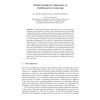Free Online Productivity Tools
i2Speak
i2Symbol
i2OCR
iTex2Img
iWeb2Print
iWeb2Shot
i2Type
iPdf2Split
iPdf2Merge
i2Bopomofo
i2Arabic
i2Style
i2Image
i2PDF
iLatex2Rtf
Sci2ools
105
click to vote
CIA
2006
Springer
2006
Springer
Market-Inspired Approach to Collaborative Learning
The paper describes a decentralized peer-to-peer multi-agent learning method based on inductive logic programming and knowledge trading. The method uses first-order logic for model representation. This enables flexible sharing of learned knowledge at different levels of abstraction as well as seamless integration of models created by other agents. A market-inspired mechanism involving knowledge trading is used for inter-agent coordination. This allows for decentralized coordination of learning activity without the need for a central control element. In addition, agents can participate in collaborative learning while pursuing their individual goals and maintaining full control over the disclosure of their private information. Several different types of agents differing in the level and form of knowledge exchange are considered. The mechanism is evaluated using a set of performance criteria on several scenarios in a realistic logistic domain extended with adversary behavior. The results ...
CIA 2006 | Intelligent Agents | Knowledge Trading | Mechanism Involving Knowledge | Multi-agent Learning Method |
Related Content
| Added | 20 Aug 2010 |
| Updated | 20 Aug 2010 |
| Type | Conference |
| Year | 2006 |
| Where | CIA |
| Authors | Jan Tozicka, Michal Jakob, Michal Pechoucek |
Comments (0)

